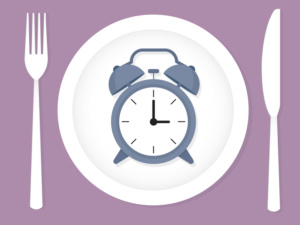Should You Try Intermittent Fasting?
Article By Dr. Linda P. Meade, MD, Brazos Weight & Wellness Medicine
The idea of intermittent fasting has been around since ancient times. Many cultures and religions observe this for different reasons. It has become very popular recently but what is it and is it right for you?
Intermittent fasting is also called time-restricted eating—you limit your eating to a certain set period, whether it’s certain hours of the day or certain days of the week. Eating this way can have health benefits. Studies have shown improvements in blood sugars, especially in people with diabetes. One way it does this is to improve insulin levels. When we eat, especially carbs, insulin is released to deliver glucose to cells. If we are constantly eating, insulin levels stay high, and over time, can lead to a condition called insulin resistance which then develops into diabetes. Other health benefits include weight loss, improved lipids, reversal of fatty liver disease, reduce inflammation, and improved brain function.
There are several ways to do intermittent fasting. The most popular and simplest is the 16/8 method—fast for 16 hours and eat only during an 8-hour period such as 7am to 3pm. There is the 5/2 method in which you fast 2 days a week, eat the other days, and alternate day fasting which is as it sounds. They have all been found to be effective along with a few caveats.
There are some things to keep in mind if you decide to try this. It is important to not overeat during your eating times and try to stay with a healthy eating plan. Avoid sugars and refined grains. Eat plenty of fruits and vegetables. Keep well hydrated, especially during your fasting periods. You can drink water, flavored water, or unsweetened beverages like tea or coffee. You can modify the fasting days by not fasting completely but consuming a limited number of calories like 500-600 calories on those days.
Some people do more informal fasting such as skipping meals on a regular basis. You can learn to listen to your body’s hunger signals and eat only when hungry. However, do not let hunger overwhelm you to make unhealthy food choices.
Many people really like intermittent fasting. They find it simplifies their life by taking away some of the decision making that goes along with eating.
Fasting, however, is not for everyone. Your body needs time to adjust, and you may be hungry and irritable in the beginning when starting. You can start slowly and gradually increase the fasting interval over time. Find a schedule that works for you. Many people are busy during the day, so they plan their fasting around what they are doing.
In addition, you need to discuss with your doctor if you have diabetes and take medications as fasting can drop your sugars to dangerous levels with medications. Fasting may also not be a good fit for you if you have any type of eating disorder. This can exacerbate the disorder.
If you decide it is not for you, there are still some important takeaways you can implement for better health. Avoid snacking between meals so that insulin is not constantly elevated. If you do snack, look for high protein healthy snacks. They keep you full longer and have less of an insulin response. Do not eat late at night, especially right before going to bed. Your body has a certain circadian rhythm and eating late disrupts this cycle. Feed your body when you are hungry with nutritious whole foods. Consider intermittent fasting as another way to make healthy changes in your eating.


